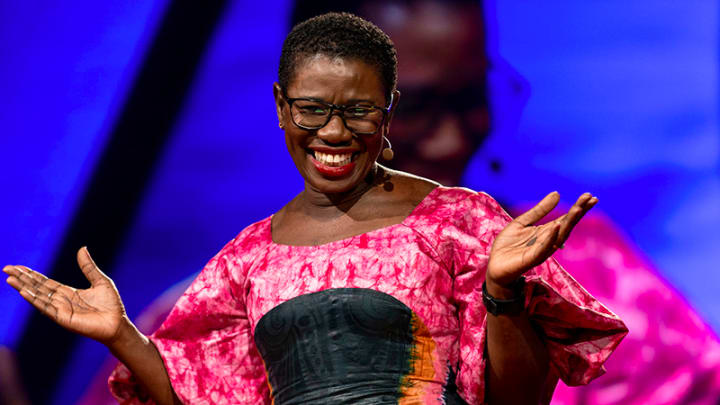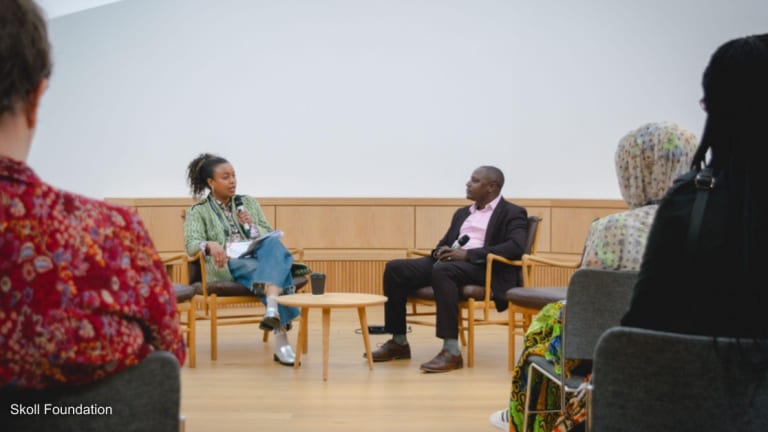
PALM SPRINGS, Calif. — Yvonne Aki-Sawyerr, mayor of Freetown, Sierra Leone, believes there is power in dissatisfaction.
The world would be a better place if more people took risks to improve upon a situation they felt could improve, she said when she took the stage at TEDWomen in Palm Springs, California, this month.
“I've worked in different situations where international consultants may as well have come from the moon, in terms of their appreciation of the culture in which they are working.”
— Yvonne Aki-Sawyerr, mayor of Freetown, Sierra LeoneDevex spoke with Aki-Sawyerr about why Transform Freetown, her plan to improve the lives of residents in the West African city, is an example of an inclusive and data-driven approach to development.
This conversation has been edited for length and clarity.
In your talk, you explained how, despite the best of intentions, aid agencies raising money from afar are not always able to solve the problems they intend to. Can you expand on how you have seen this dynamic?
More on Sierra Leone:
► In Sierra Leone, new Kiva Protocol uses blockchain to benefit unbanked
I think there’s always a risk — which is handled differently by different organizations — of program design not being appropriate for the context. And that has a lot to do with structures of organizations, where sometimes there is — built into the way they do things — this concept of the external consultant.
I've worked in different situations where international consultants may as well have come from the moon, in terms of their appreciation of the culture in which they are working. And in some cases, I’m sorry to say there is arrogance in terms of what they think they’re bringing to the work.
The fact that someone tells me, “Oh, I’ve worked in development for 15 years,” means nothing.
To me, it’s about people. An organization is machinery, and organizations are neither good nor bad. They can be fantastic in one year, and terrible in the next. It comes down to people and teams, and often it’s very dependent on who’s leading a country office.
I have worked with organizations who have been very collaborative and aware of their limitations and the need to engage with local populations. It’s about who leads them at a point in time, what directions they take, and what policies they adopt that determine the impact they have in their sphere of influence.
From July to September 2018, you and your team engaged 15,000 residents in a bottom-up effort to understand their needs and priorities. This informed the design of Transform Freetown, your initiative to help this city navigate the challenges of rapid urbanization. How did you work with development partners as you put this effort together?
The most successful interventions are ones where local voices are really leading, which is what we seek to do with Transform Freetown.
We believe everyone in our community is a part of that community, and we really truly work with everyone. After I won the election, the first group of people I met — even before I was sworn in — was Slum Dwellers International. It’s not excluding the formal for the informal, but it’s making sure that we’ve got everybody at the table.
Sometimes development partners and aid agencies find themselves in what could be a little bit of a leadership vacuum. If you’re working in a context and don’t see strong local leadership, you tend to fill the gap. And, unfortunately, what happens is people get used to doing that, and when someone comes along who says, “No, we don’t do it that way here,” sometimes you get resistance.
When I came into office, I had three big meetings: one with government agencies, one with development partners, and one with NGOs.
And I basically said to the last two: “We’re doing Transform Freetown. If you’re not doing it, then you’re not in my city, because I’m not here for you to tell me what to do. We’re going to work together and decide what needs to be done. And thank you very much for coming with your money. I appreciate it. I don’t want to have to use it forever but, for now, it’s my bridge until we get this city self-sustaining.”
For Transform Freetown, we set up working groups, and we had development partners and NGOs join those working groups. We — collectively with private sector players and community-based organizations — articulated a theory of change and then developed targets. And because we did it as a collective, their fundraising activities were immediately aligned to the targets of the city.
At the United Nations General Assembly, Freetown was one of the local and regional governments that committed to the Voluntary Local Review. So you formally committed to reporting your local progress toward the Sustainable Development Goals. Can you talk about how this agenda aligns with your plans for Freetown?
I often joke that when we developed Transform Freetown, I’d never heard of an SDG. One of my colleagues did a matrix and mapped our plans to the SDGs, and they are aligned, and that makes a lot of sense. So I often joke and say clearly the SDGs do make sense because that’s what we’re doing.
From SDG 1 to SDG 17, Transform Freetown is touching on those.
I’m totally convinced the only hope the world has of successfully implementing the SDGs is on the local level, because the change we want to see needs to be delivered on the ground by local governments.
Transform Freetown is an example of data-driven development because we set targets, which are numbers. The only way we’re going to get to those numbers is by having the data — both baseline data but also data to drive decisions and data to measure progress.
Our targets are all numerical. Whether it’s facilitating the creation of 4,000 jobs in the tourism sector, whether it’s building 5,000 new homes, whether it’s increasing vegetation cover by 50% — in order for us to succeed, we have to measure all that stuff.
And for us to measure it, we need data, and the data is what enables us to know if we're on track or off track.




